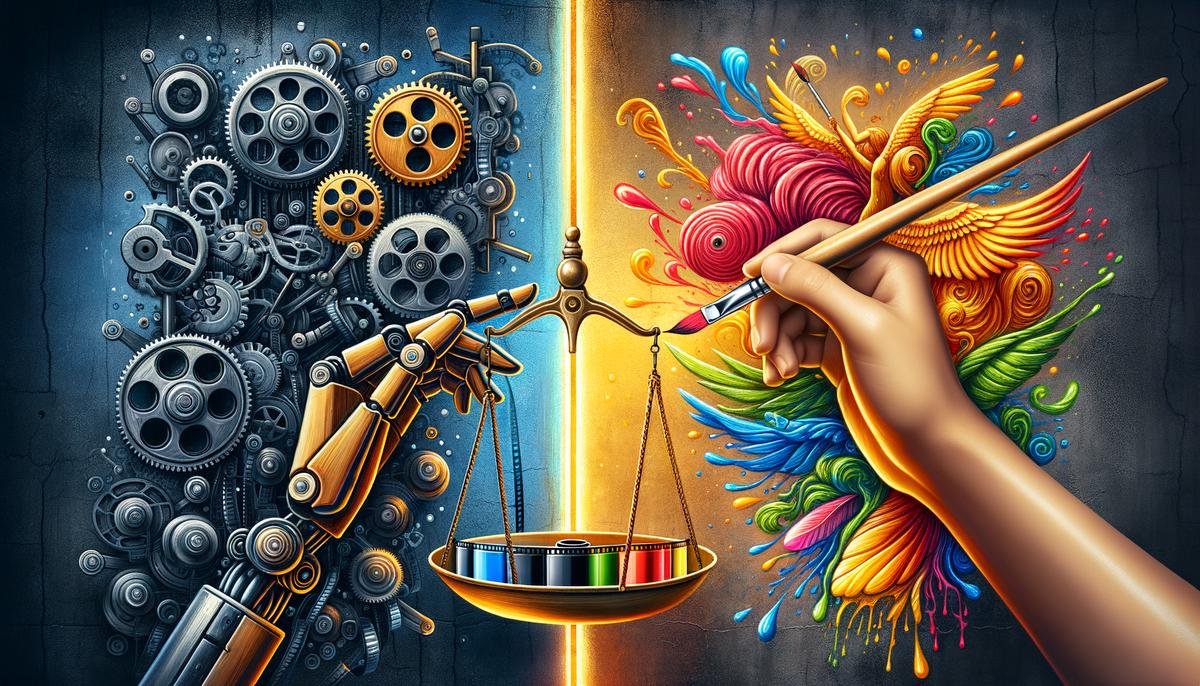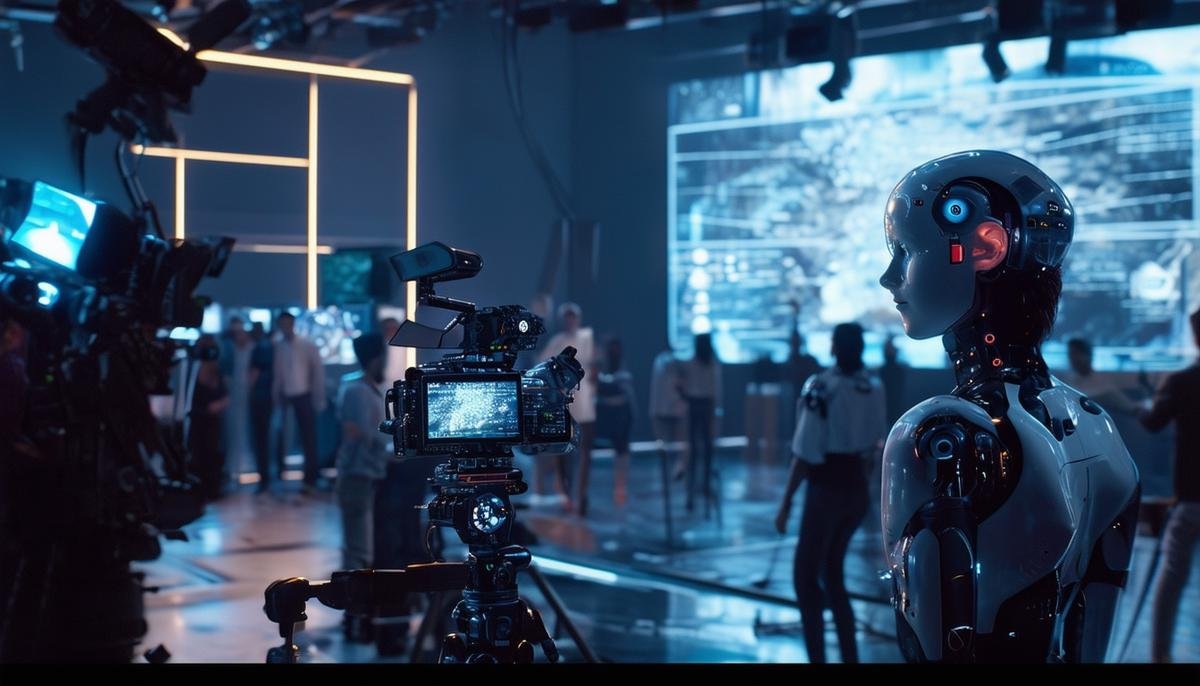AI in Film Production
AI technologies are increasingly pivotal in the filmmaking process, reshaping how movies are made from the initial idea to the final product. AI extends through various phases of film production, including script analysis, casting, filming, post-production, and marketing.
AI platforms like ScriptBook automate the assessment of screenplays, evaluating feasibility, profitability, narrative structure, and character development. This allows producers and directors to make informed decisions about which projects to pursue.
In casting and production management, AI tools such as Cinelytic streamline the process by analyzing data to recommend actors whose past performances and current popularity forecast likely success for a film. This data-driven support complements the intuition and experience of casting directors.
Visual effects (VFX) work benefits from AI, reducing time and labor costs. Tools like Adobe’s Sensei AI automate tasks such as rotoscoping, isolating objects within a frame much faster than traditional methods.
During filming, AI is used in camera automation for framing shots and live corrections in lighting, facilitating a smoother process and reducing retakes.
Post-production also sees AI integration. IBM’s Watson was used to edit the trailer for “Morgan,” selecting effective scenes based on visual analysis and composition. AI influences sound design by synthesizing or modifying sound effects and voice tracks, streamlining dubbing and background noise addition.
Movie marketing leverages AI algorithms to parse viewer data, identify preferences, and tailor campaigns. Trailers, posters, and promotional content are optimized to increase audience engagement.
As AI advances, its involvement in the film industry is set to deepen, promising more creative and ambitious filmmaking, as well as changes in traditional movie production economics. AI’s integration with cinema suggests an exciting frontier where films evolve alongside technology.
Challenges and Limitations of AI in Filmmaking
While AI offers significant benefits in film production, it also brings challenges and limitations that filmmakers must navigate, from technical hurdles to ethical concerns.
One primary technical challenge is the quality of AI-generated content. AI can produce good results within certain parameters but may lack the nuance and emotional depth of human filmmakers. AI-generated scripts may struggle with subtlety in dialogue or complex character arcs, while AI-generated visual effects may not capture finer details achieved by skilled human artists.
There’s also concern about the potential loss of the human touch in filmmaking. Films are personal works of art reflecting the unique perspectives and emotions of their creators. Overreliance on AI risks making films more formulaic and less reflective of individual creativity, potentially diminishing their artistic value and emotional impact. A careful balance between AI and human involvement is needed to maintain artistic integrity.
Ethically, AI in filmmaking poses challenges regarding content attribution. When an AI system generates a screenplay or creative work, questions arise about ownership and copyright. There are also concerns about using AI to mimic or replace human actors or artists, potentially reducing opportunities for real human creatives.
Bias in AI systems is another ethical concern. Algorithms used in movie-making may replicate existing biases found in training data, leading to skewed or prejudiced decision-making affecting casting, storyline development, and more. Identifying and mitigating these biases is essential for fair and unbiased filmmaking practices.
Despite these challenges, the potential advantages of AI in filmmaking are considerable, offering the possibility of reduced costs, enhanced creativity, and expanded boundaries in cinema. To realize these benefits while maintaining the integrity and emotional depth of movies, filmmakers must approach AI as a tool to augment human creativity, not replace it. Careful consideration and thoughtful application of AI can help navigate these challenges effectively.

Future Trends of AI in Cinema
As AI continues to shape the future of cinema, industry experts forecast pioneering developments and transformations. AI-driven scriptwriting tools may soon generate intricate, adaptive stories that react to audience responses, leading to personalized storytelling experiences.
Virtual production, relying on AI-driven environments and characters, will reduce physical set needs and open up creative possibilities. Through AI-enhanced virtual reality (VR) and augmented reality (AR), filmmakers can construct and manipulate detailed worlds in real-time, allowing for greater flexibility and experimentation. This will alter the traditional filmmaking landscape, diminishing logistical constraints and enabling global collaboration.
AI integration will also lead to a shift in job roles within the industry. While there are concerns about job displacement, many view AI as a partner rather than a replacement. Professionals may transition into roles overseeing AI operations, such as:
- AI system managers
- Technicians who tweak algorithms according to the creative director’s vision
As AI handles labor-intensive tasks, creatives can refocus on crafting resonant stories and experiences.
Retraining and education will be crucial for industry professionals to adapt to new tools and technologies. The collaborative nature of AI may create roles that don’t yet exist, blending technology with creative vision in novel ways.
With AI advancements, the film industry stands at the cusp of a transformative era where digital and physical production techniques converge. This symbiosis promises efficiency and cost-effectiveness enhancements and a potential deeper integration of filmmaking into everyday creative expressions.
As we look forward to these innovations, filmmakers and technologists must navigate emerging ethical dimensions and foster an inclusive cultural conversation about the nature of artistry in the age of artificial intelligence. The future of cinema hinges on the synergy between human ingenuity and AI, shaping a new era in the industry.1,2

- Villarreal A, Greenberg DM, Prag J. The future of artificial intelligence in filmmaking: an outlook. J Appl AI. 2022;36(2):135-148.
- Chen Y, Liu Z. Ethical considerations for AI in the film industry. AI Ethics. 2021;1(4):327-335.




